As demand for sustainable dining and green edible products rises, high-end labels across categories are stepping up.
Culinary, hospitality, spirits and even fashion brands are showing support for the slow food trend specifically, releasing sensorial campaigns, hosting ecological education events and debuting farm-to-table menus. As the uplifting of local ingredients and traditional practices is widely upheld by the environmentally conscious Gen Z and millennial population, it seems that choosing to embrace the movement is an effort that appeals to modern consumers while still keeping luxury’s high value of heritage at its heart.
Food for thought
Millennial and Gen Z consumers make up a profitable demographic to focus marketing efforts on.
According to the 21st edition of the Bain & Company–Altagamma Luxury Study, released in January 2023, listening to what this young population wants will be a determining factor in development during the decade – those in these two generations accounted for the “entire growth of the market” that occurred in 2022. Gen Z especially is turning out to be a key player in the industry, with their spending expected to grow at triple the rate of other age groups until 2030.
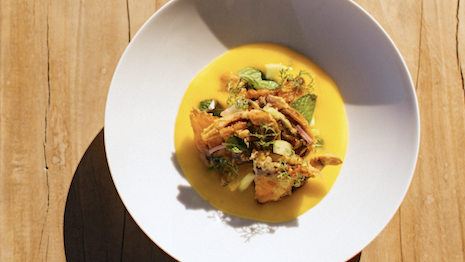 At Four Seasons Resort Tamarindo, Mexico's rich epicurean traditions are honored throughout its menus. Image credit: Four Seasons
At Four Seasons Resort Tamarindo, Mexico's rich epicurean traditions are honored throughout its menus. Image credit: Four Seasons
As value-based luxury becomes the norm rather than the exception, it is no secret that the youth is largely behind this (see story). Experts agree that the sustainable population is a vital target to gear advertising to, revealing why the slow food movement is well-positioned for adoption on the part of brands across categories.
Luxury spirits names have been particularly keen on this, with many not only providing green drinks but educating customers as well.
French wine and spirits group Pernod Ricard for example recently hosted Nurturing Terroir Week in Paris, an event that allowed its employees to learn more about responsible viticulture, urban green spaces and the framework the brand is using to ensure operations align with the needs of the land on which it relies.
Footage of the programming is now available for the public to view, spreading awareness about the benefits of seasonality, thoughtful sourcing and why wineries should strategize based on the health of local soil.
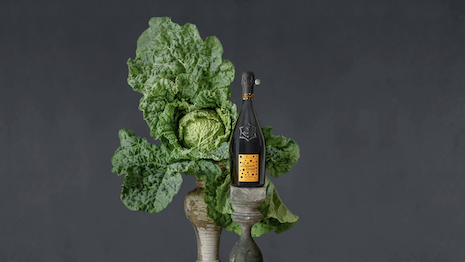 Veuve Clicquot is working with chefs to show how its sustainable La Grande Dame 2015 can work with localized and seasonal ingredients. Image courtesy of Veuve Clicquot
Veuve Clicquot is working with chefs to show how its sustainable La Grande Dame 2015 can work with localized and seasonal ingredients. Image courtesy of Veuve Clicquot
LVMH-owned Champagne maker Veuve Clicquot, a regular supporter of slow food (see story), highlights Garden Gastronomy, a vegetable-forward experience with produce at the forefront of the meal, rather than animal products.
Herbs and fruit are brought forth as well, and at their peak, are paired with La Grande Dame 2015 (see story).
Fans of the blends can taste the earth-grown food at its best, as seasonal chefs around the world collaborate with Veuve Clicquot by putting dishes on their menus that highlight its cuvée. Pinot Noir is placed beside sweet vegetables like carrots, and autumnal wines are recommended with dishes like pea gnocchi in a chervil broth with thin shavings of green apple.
These combinations are dreamt up at the Verzy vegetable garden in the brand's historic vineyard. According to the maison, the space's “300 permaculture varieties will be used in the creation of food and champagne pairings for a new era.”
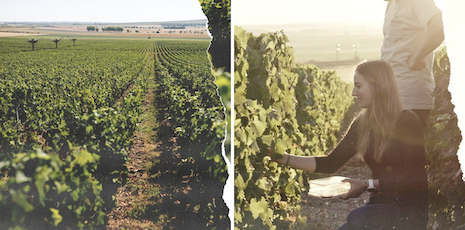 In France, Ruinart is taking a look at what the seasons are saying, and so is the chef that it works with. Image credit: Ruinart
In France, Ruinart is taking a look at what the seasons are saying, and so is the chef that it works with. Image credit: Ruinart
After releasing a climate-conscious, first-of-its-kind edition (see story), another LVMH-owned Champagne house, Ruinart, is gearing up to pick its grapes, sharing this short period with fans on social media.
Revealing adaptations to shifting temperatures, the region’s characteristics shine throughout the content.
Michelin-starred chef and maison collaborator Arnaud Donckele is also given his own moment as the label applauds his hyper-localized cooking that falls easily in line with the slow food push. Using what farmers around him cultivate, the culinary giant is putting traditional practices and elements from nature on his plates.
Mr. Donckele shares the same philosophies as French fashion label Louis Vuitton’s partner from the food world, Maxime Frédéric.
Louis Vuitton's gastronomical giant is bringing the land into play
Proving that the apparel category can get involved with this trend, the brand has been publishing various short films that delve into the figure’s love of sustainable eating, celebrating the way that he sources and turns to his homeland of Normandy for inspiration.
Using concoctions from gardens, orchards, cow herders and the nearby ocean, Mr. Frédéric’s show of support for slow food shows that the movement is essentially the simple notion that eating according to what is local and in season is not only more environmentally friendly but also delicious.
LVMH’s Moët & Chandon is on board with these thoughts in its own practices, publicizing its Natura Nostra biodiversity program that touts a “from vineyard to bottle” approach.
Through restoration work and innovation, the house is taking a holistic look at what luxury Champagne can be. Additionally, as the harvest approaches, Moët & Chandon is reminding consumers on Instagram that Benoît Gouez, the Cellar Master, lets nature’s phases and the locale lead the way.
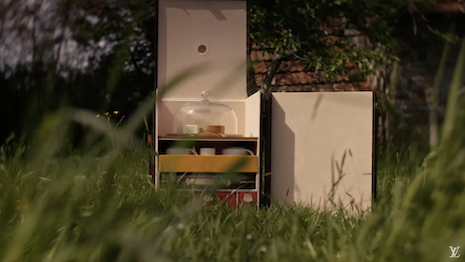 Louis Vuitton shows that even luxury fashion can benefit from green food activism. Image credit: Louis Vuitton
Louis Vuitton shows that even luxury fashion can benefit from green food activism. Image credit: Louis Vuitton
With biodiversity-friendly business habits assessed as being instrumental in achieving enhanced customer loyalty in today’s market (see story), the moves being made by luxury spirits purveyors and even fashion maisons are beneficial to not only keeping current consumers but to securing new ones.
As the point of slow food is to turn back to the land and honor traditional practices, adopting it speaks to the heritage values that longstanding luxury consumers support, while also nodding to newer customers’ concern for the climate. Keeping this in mind, it appears that sustainable action solves the critical question of how high-end companies can retain old-school loyalists and at the same time welcome new faces to the table.
Tasty tourism
From The Ritz-Carlton, a Marriott International-owned hotel and resort chain – the brand’s Marina del Rey location has been highlighting its farm-to-table restaurant all week – to luxury hospitality group Four Seasons, various hoteliers are showing off how they imagine slow food within the context of their operations.
Four Seasons especially is getting ultra-seasonal.
In Napa Valley, guests can enjoy events that allow them to participate in the local wine harvest.
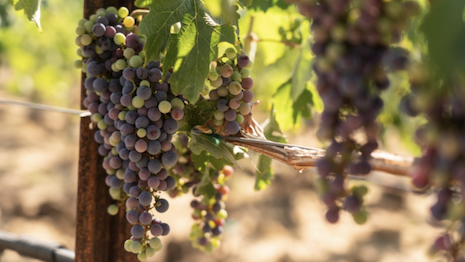 Known as "crushing season," those staying at Four Seasons in northern California can participate in the signature practice of the area. Image credit: Four Seasons
Known as "crushing season," those staying at Four Seasons in northern California can participate in the signature practice of the area. Image credit: Four Seasons
In Tokyo, the brand’s contemporary French restaurant is making space for the region’s Japanese cuisine, inviting epicurean leaders to educate travelers at an upcoming event that will pay “homage to terroir.”
Held on Sept. 13, 2023, and Sept. 14, 2023, with seatings at 6 p.m., 6:30 p.m. and 7 p.m., bookings can be made at https://www.tablecheck.com/en/shops/four-seasons-hotel-tokyo-otemachi-est/reserve.
The activations go on, but based on the plethora of places where Four Seasons is putting local food traditions, ecologically-supportive eats and nature in prominent spots, it appears that the hospitality giant has the hang of this booming trend.
{"ct":"HBFmnMDZnJk4TvIsQhAQnnnnQN1U1SQuUGM\/MTIgswagGvEYxGifoKZXbXxdzeH6RSq\/lmcbmjzHM3KvYFQTn6JSEvuHLDF4lFOKBGQ8DpPkp++iPscXGfqKInyPeSS7an3iJatBrMEahtIAkAi9EDuUo7IXZYrJ7I0\/UEggWUIOimOOroFDNPxzLzjEYo6Cq6LgmhufL8ZIFdk\/Q2P9pevH1BZrATPJZwGR95hmwDHDtJdeJLHHVPXssTSm1RQ1Jeg0pfFhBhAoaMW8G92IhITW4WpjR\/9YTbUEs9DbFUneRABRHQ4C8N9XS7t3S\/uZ9lUEmXR0pLHzuvsy3fu1Ro+Uq759jxXyvtTqTJLTUdvOA+nh31\/1+r73HVgp37XCm+TctMiHljvOEC99p5QaMtRi3cFkfmEr+7mSlPNRSeTc8h5aLUXOSv83IOWtcs5ZgE1u9x2oVL+EsBhZK7vsu2d3b+nvYT8H9B0Aeqq8JROjmh4iTm7UcCofA4mwf8L0T+GOkGS8aAz\/KVkpLL6XlUsfgbtVuPWr0b9qFrIgtr6eheJNTBsgzKg2nKy3HyNL4qr0E0KVPO6Pe03lc3nKWCFm5IAcHJgfOXrcIHEatqpwWsPRIB+olL20VQ5kE6jXfe2cb9kiBSFDWeD7j90EGuGiEbI\/MJAlUqbgpUYaqc66HlKnOPvmi2NVKAiPTkY\/ZRZW6yePv7j6fUiYOuFLtTy4GFTUaL7iXGLLLV6wRWRKWdf2vJ2f3EUMev9QWwBTnLbAFZFZitUAjH2NTU1pyZONg01Obi0jDN0sidrS9pFaxxQixOnO5nQESkEdHOnwoun3SLC1z+3bq2lhIZSI25JV3yv+xgPUgthzOUgh5D9QzdlFB+k8XTYHLrmkCD\/P01LPQgIMgzuNZV6X8W10IcJPhONAo1204D7r+1exlQZPybtv8Bl\/TipizSie23TjTjVN0kAo0wG\/PZpmsSkoMB4csezhIXJmlRRgj\/5DacFR8ZDb5X9jkFE6rZ9qRNdhmnVDhZdhW02FXGxOW8qr8vs4ajYI9Qf7+qEOr7v6DuA66xhuP4eIIOYArDwhc44HpxbPp6\/c7WtI\/WKob2cdEHqQ6hmjdR5t9vEtY\/KlpIwJiX2VKoCa+RQUzRveY0emDCyMUeF66ng8TBS2+u7o\/c94PxYx9QKesgdpSa1ZC8XXU3B6OPGhZ0zwv7C+Pz9++n5FXQO6Rky3CLnuPrgJOVqMrJM1hFKE5P6oHuzijghFx2u4P3KVSnuUU9KE7wKWCabP4dlHEclCyYxW1zg4RoaDvGvEIpaDmO0+oo5jqoQxdwGBfXqL6z7qFACwHw0h9RVDgkg08+GZT78wsvgd\/Dh6\/5JkmI+teTGLpQBgQctCpz0jipKxeuX7DPotvXvoe\/zoOlIAGpkv1A+hS+AsPElBa9TF7Wnfrs3KOst\/ZLhqI6WIJ99xzTE2tmuV5HLlYmVvTBmgQvz+x3RazIqIg\/r4fRZAa5m8JOl4uRTOpqIQoImU\/p54GVI9WdyNpjZxYVhPJPu4SbOHx6N41YRnlk60hcQGyfyHPGaO5lP1CfDTulzfDd\/Trh4BXx4Z\/5+mAYGuOj1JYYTabuT0uKP9u1pvP\/zCDJeDu9qnVrKuGAulGpTIYg\/vuAXL86zOSLbtQhVEtIwlB4aCLrZethIXLaCvz2iAQHr8Slc0h9n+cbczY1Tn1Oyh+JjSmlOJNctgNn6zV9Q+qmAFvW8CvANS94VzZq8OJrVPCRtw605gkVmrxT59kXkVddWI9tnbmjcvr05JT40vWaUfm9PbVmp3QYjbAQHv7wAwbge7E74xwA1Ccdk8DyybJ+sATOcOWAam+sTgZx2eKNnkVvu0ue6YaQDiFpx\/J4uQhUZ+s2k0iYE1kBQpaW50X+akdxEB3xrf2gTYsxMNAbSCawWCZ2DWxQrQh+1iRFpNCYfnM20wBX9RFp5CUzyZNUZV3hFSdcifWPDAaoXa6LPLd6nWJoqFaoPbcEbifUFw+ALB4F2zf4V\/zzlGNt3HGKwR1bssTVarUYJCjXIrkEve\/G\/T2vTqbJhPJjj2SoOQj82PoRkNQB+HCRNW\/BuEyzVKFSg6t6JVjIbEEkrmI9YPP2sPQmfj6iwtlquZacEpknpZj42k32+fXn5r858RvAw\/oRj6LMg41QTjuXd3yhCrYGCBwpoueOcbyWYdehMwdOR49\/e6fovnrRyvEf6HyhErcv7Tmvg52+joOmexTKDoRtHHCecTf+kSSzvmuAVHW\/T+lFt0hO0Y2j8uIFVd8TFA39r3yHapjdDAwSyv4gM45gXAoo3DE1ZblFNrkv\/HaWIqaJDxIWhFfovZ0OiXsmJaUc4VQQmtx6CxeVxMoHI0YkpVJG0o5e4p8JssYIAMCuQ1AVnHCmoMbKJCfC+341bVpJnRmOurk\/SdaqKbsRKsTGphPCHxjRbvnehfPBXFt3PLSRMUln7uG5cMu78TmwEf1eO35WNahdwKYoBm6ARMNcpbO2bJvXqGFmR8LgOEGf1djAjJWUvJyNO8Gkt2gISlfVrm8uzo1fsWpYMFW58uEqks19uO4jLIHikkkV53jqg4eY7NSw6ehF0JgfaFmKRQ31+xlIOXObuYcSuMrZF9GxgGqCNYVQgR+w+fhNdJwSq7ahM8GSlWKd5qx86oT7YfY0elyr6CHJDHjsH1QC3aGjpaaD7qP8vIY5TJxM8z0lT0uik3r69uUr2JN1IQaXEg96gQ+V4DGzs8laxFqjCKmshHbh3DRJJmVVUVr++HiB\/YmDxoeh3ibiZfUGjhwbeqP0Bp4sybISGg9kaPnBIQFlvnnGw4d2Wyt7wVL\/ANCxLtZIY1Tm1l08+q+CsGZa1GmzMTPelx2X9Z1MBE47pJFUIonzeCIDahr\/mUm8H\/JHIudTG0M2Z5qNPYk044u+x0+cHKfIGWCJvDCzkV3G8VypWTLMzIVpGs5tTYsXnvClWEOcAi4GsluS2suM8Loa\/oTga1rv0kVycEnkh3kW2IL4hXu+JeKgdm\/gcocpXNqi4iHraZ0UOMYjZ7FGYt0MvnDwkaTVSu57g5ewS+IgG8RFZopRePXoyooA3XiwJKK\/JYeXiTKEYYJbGV3AVAK4eLsnanod3diJutlB+2gd14Jm8jr7Hg1jyBLynC8VDW+Rrlvr3kHGfeJwlyR6P9TokhSZwB5MOZvzgoVaCcj3hFryeasthTc1U82lLrstGk3ywMrFSOzAR4TqHlFwZKejG+\/tmRo3\/vp6P4mjVYHZC8FjbeB\/1AoJF9bkc7WD55IL+kBQL7VJY7B9XnOaiHuEIUNuab\/JdWYOsj\/MV9Af7iUyQyG1WW9mC74PsgiiqhKyLO2tmGN\/tBZ1IGJEeXOplZntPsy7GvNN9VP1W2K5ZZRgnD+86QopYuuIfwuM4XH11M4Bbe+qt5II\/+I2pxv2Dt8nn1vbeCPin1Py0kGD\/KiLxHzZHR7QadLdTUFZOLAcGM9MuJ3xJRa\/UaID\/YBllyDz+BrGepsX4ZU6LZ2O3fcp3H2IQTi\/Bd\/dwfyqZB2VEvo8rw7amX7X5PLbNrV3k9VHaXH10GTNM9qoLHk38jee2wgFpQyIkdM+XNJ2JbVdtvK5+dai3jfHZVfNIbXGUZ1Frp5lU38qNUNZj00E+zM621yeSWBKxX\/d4pRvukfC8qfNgfQyGsKNtHauHGg+TJAAJIKntiYuKJvXSIs340fLKs8mA6t\/JDuoyH05ORkyJELk8j6sf8usYEpeyNjY9MbD71rItYyLGwR6zCZBlLFhttOPtfiglcrmcRvSy5AnzB0Nw92h9zXvkqWjPdygfr6JnWOzCgR5DWqqzhug2J\/Q9c2eB\/WRcCP7P6ilRJ0pTQ4eHgpsy4LgHQ8k+NZ5m\/Xq7zU9RE3A00agV12sdF1MjR2KCh0nNUsW8BNK95DxP3dxDM5djdGE3dhO0Lu11LELplTDiYxsThEupwy8IpayWyukFCFwgy+o+VsCGbga+eH2bJqMzzkkj6DrKBdfSexoAs4aJWEaB0\/3AJCO+sCRqQq4BDu4wMq3wpMSVKuo0fUdhk3+5+eAQaq2WRhlekf4PgC9oX40JnrKON3+dyaVYEMdKX\/oeWHmzZZnewk666nDXhOi7OKbM\/voKRQgh6oRrJcnXw\/2w+eSoGZlpJ6+EdLg53tdXIKl3OGtxUpuh25T2hUMs18+QBJ7LZcsth2dYSOetiLMrY+6mH2\/H15m94QgrtS4NvEG2KweIaB9x3+fCHJvr+xh7J159e5oukW3lU8F3HSUk0j+Rl4OpDB31M\/99+v7cqKwxhz91dubcAiUZiUfl6Z3XLq8kdoCIUJ77cVqhjg9KB1IF16s4giWPQ1IYrKQumPZfebUkC0MJAvIn5egoETIQzCxH2hGjLkTJRRflRMVg8Zgq3gP3djY32A62MZv\/ErrDZE5qAjeW3zlO\/fMNvN2kjokqsBt22+Wv3FXm\/z+3B5j2KQYkqb8XUAf4A5cPWYfK4oaY03dgjR74H51NsJfCWp7lbrgMAd8Whu8X29n7N3OMqwyyq4g7rcgI2IstcE2Xn8T+8LsQgSHg8mCkIfRCNsujGoXoyQZthFAE\/0ws8fqOoj88M50W69HQOZbmI29mKsUylpbP9bhiDYyDBQioDYojR0+aRZD\/dIc27p\/\/Nv3G8Bxjyv4gQKkKLXSf\/EDD55U+Z93ReHCaUSOYzP7BkOp7UmKCM5o9KONywSqAUH12T26RM4BK\/K0vEKOM1pXXv0SbIiaS+cpJPmfZQwEY0YUSnfTTKhNYb5KcEGdWdSahAB0O\/VO\/51M6mdZXikJO52Xba++WGh3uJuWUIZhknpRFOmAZ23Mk6YPKgIkgsioDpubziyK0bJSrMJmrPwuJ\/hNxy\/hgngcqBZ5Eb750BaD1jRI01QnPtZ2UEZsnyMyWjv\/8Gssku2Q4ch0mm24Qngc7H13ONyWY\/Jr48DF58hBIavtllrDmKLu1ITpqq5jrnkS1ZZ7RKNvU7CkQ3kuN8vcsKb1PwCmyhYXczu9qTqukGEWlXhE1B2JeJsnu2Mmj6QglxyuTHN2xQI8bzahDxsHJ2Rh9Y\/HkcMPBiaIHedZmwtIPxTRb\/UVkXjFk5puaqxIGlvO0aKsq1gxpDcrAdlfFFcxMV3iWngPPQwmioZmsekUxALfnqmIkDZ+Ub6zv+wCPBZpdprQ+wi9kv3IpFKYqCvnXjK2xYE29zmJtqVq3jp3wKf\/RGO9jT5MUnQTaY7IAgPrdKKdhdUlOstXRD8tJTGvOHLijNhM43bzhn6G9+oHht+EQHpVSXb4\/1eZBXrXUa3aXWUJvivlhwvdavE159AfolKmiV4nhHVZ6jWLXt9vKOCwG7wHM5mc39jdo8KlYdAKMiU0A06fDLKe0GHMHSUdLY20tloPIgKztTG20aLFG7UEipcs\/Se7REZsMQoKXtvnXdmaBP0OG9ARqvjZ0UpD8s8QMsuknEKEvJXARlfE5KFeqzraeRmRJEjvW+9wczNCjV6emuyjoPe79+bUgWsBJjKJdhCnGgcw5hsRMui5caLcN5nkVf7xV3bGbJFsj0VGKKf+Pj538AYNx09AjVsQ82ilWN\/lWBG2n22HWDWiJuAXiiJHWBa\/q\/d90Cft1BWQLV+i9bqJRdqUCg5rYLCu888omBipC1wxzPbYcvHYEAGip1Vz6DEHL7lhTGIknByVVmOedtJqlEu9vF6ijpFCpCXeNj9Xo4J+rFnQYF4wXywNMko3WbQxwybSY7c7QM9p1E9q4EBbL1RAfobad8C7x9I1NYhOKsULRaRJEmUESreuvENBGsb4TV8WSWMT7x27ytX0\/PKxkWAPL0PoPZI9zvpsMszgZaVQMfxvKTFBCnlIWJIr5j\/57EtUlYK+awk6BnQj\/52hHVuSchplCl2O+0fU4MLAwLASu0yZHjXEx9BPza4abLq\/yWXmZUBig2oLPt4\/TJc1z7an5A2ZzRPzjyXiGMfCKIVh7wyZD3lF9Gl1oK7emOJ5ZfceuhPOrC7ZMQhkmmeIV7z\/bIOyVhH2un1iOiEOkRiUhufllFwUyR77woQaj4C1YL\/LSYC2HXSz4kPjbpOcHl6zAzYofwZHIVeIpmJ1JJDMJ905OjmCGarkVlMePIl34rMKbjvYdsMYw\/yAmfranrIQwi\/bma7J78yw1MqOSrHq0gp7QwfaNF4pCOS3fkLN1ci8WXPpwgUkGnjkT\/NhzzbmLnsiDjCkG27NmK8uw6dYjO2Owp7kxJZDFOgOrvL0zrH1k+Uw2IU12roTJVge1XyAnkyeaY5OMFmZiX7knNw2xCDqRQY+\/Sm0f0sqHodjY7T+iOqCKpsHRzsHw\/27YAe9PiTTQS0K8JV5+10aVqP0qHbKPDbdFC6B+VS2qHds6cor74MQOIlJOSyyWUwXMrHHXnvMJoNNBYLKapWDZK\/6Himw8lI24LzbNzG8EDTBDWaSkUVDeWLWzdev+UlAX3RXn5mvAP2BtmNb4bPW+jZV7ecOs105uD88xJ3qfVd3Zu1qPEQ6f6XgZ5T+Xx+DeSt6lfjZXIMhkzPsZhdxOqNaHW6MAqZrcn034GTJNIFbe3J\/KQk+LSmEJEaf9OIQ+0kw9DbcIByFyPmxH0KupSATBxYNSpAtqJUeDiGCBLZ3uEX6hQnAlWctmY76I99xlHsSrh9SfT7jozwG3L1nqCT2Pp\/jsjS4VLp2YuAe2JigYl9+uFE61Jp4kBY+k+g5qWANtwBi1QXrR4pvN9XP6QUExmOoKgdsnhhHYkFu1VmWZ+RYmnC+TNqjda7uGh33P7WXPWWKiP9Hjn2bX4sBCTmqCVDk\/xuv7aDUsMubul364tydzrX4U5G3Ivmu4T8E91C2l592OFAvCJNf1zVFjEY2egJWChq0U1PaZ7VagiIV1Hr\/nHlI8aQ5rdzVendD\/EuvVIcyApylQ+bSNu5qPe3hD88NBqvOsD0yneQ5OtqYcAx+UzJQ0jH7ks0MbZV4RSSUrXV0yc3nC7htcYQrbsOXaxG8sEUpMnVsEAK\/8SKbtb6qN2ZZlpvJ839flsIuPfUCHfPhomc5ZRGAgL4fYmd81R2JgkVSmWc6IhyX7ETRpz\/v6PqEkz7vCmecIH+zBctUUpm\/F+VqpRk57vwh1vsH12Xw4+uJEoau8boDfn6UTra6KEhU2Gfi9ZAcXJHUHFbkF2G6wFT+3CmW25pnto9jgthaV5DCi9+5t5lKfy9HVxL+Hg\/7SzPDo2a1F3wHKH0e6XDOY5qfTeCxDopEMuYDrkJfUocNoWVsrzdMuS9mcp9nlSg+VVQBzc3NDc77GbSLBdKTjD30\/8PcctD0zsgWDaLpFedQ+xBvhdBnLMMWsA4F1TLRvbF7R1y4kxFvweQZdxgTF2rIOTyG7Jia9ODfPH3Vv0eROH3IlJPII9ZjNHjo7KD\/5tT63sxyHbiQ4KdQ1hf8gZOEYlHkK2+ZAvlMZnYgdzhhQRAernCmdtFD3kbnfL\/JfCCPNgMgVno1LXA1l0EstIuFzCzDqZTxTbDS04Xlsd5NXGd1Oe\/aQvhw7+os9wO2j3ZH4XSEzcMjxSNrnwL64MIB\/fpWbspgZB6YfDjxKkUXGoxqz4TbDjMM8mpgtAPuYOoqNVH2CD7VuD80KqBUDwRXQEXKCK45HNViY5PpAg0Oht2o6vVYUvGNQfIDv+Xjwa0TCMf5qxLGdaEyUkEzkvp0\/gL2KuzqCOy\/xT4ioitBE9mL1B8lJ8odfcEvi9RmKNbtXu0IRtFX8DnfSdCbmilRQuWaQJQw7fa7Yjede2qQSVb3A0e9Ze3RQ0c3HuFgrFGW0c79S+lrrzKjIBh8oV0zZtfvcp\/hYmlYaB36bHUmlGpowjHbMQ0gaguf\/gT8ECuQnai6DYxolqz07156EX2xBpaKy+wj\/6ZV8f8RhZ4S7S2vKpvdjeYdH9AuETCUSiZdQxEHlDTLneRtTu3TwC0EZqCs4ldPXkx6chKqa95hGucPZOGEe0lZw5WVoLOFNo7dJfV2rdIAZ5Rkm\/M7c1wqMv1K8UyI\/L7T99YUQudmcpSN6BlHwqpRWR621zpvVeyM6NxF2AYuWpM+a+Q\/DMxspioVhOJM+5UdR0bchY0VWV+nKqmdDZxbbfJ4DcAdzMfY+JHxSPXJidymIVr9T0HCSXdn5XsvS+0pv1zaSM7nhCx64quGGFEEEA1gtPnopoq39cTp51aAFlxAMkpHA8tfCoRgdXRAABt\/CUXvJaPxPYWLnpL6WwTHzQ65cmywBrwCoOHL88OehE992+pawqIry4BaHMet\/vTWh2vGHYmfBxO+\/iyPSa86bld8UKmOX6UXOvx3U82SkEoesXql4icFI00MrNgmgSXUxBtCD6T0uD8tiuVMWBSX3wFoRVu1TXdsC349XPTsQVbNSNjYzLfyZzsFOB87V7d+P4snfddErnyqFZzSQOhq7v7hVSQVTzKZqjqAzWByEgH+SjDTI7s9VLoHaylo5JpbmkmAkfoGJlbDfmlk92yICNnKE1dm1ldxoGQKFW4qR5+3pRqfA+weQOiVmwOEVEWWGFRpRzRvcEpVmBDzYB63D2zUU7vawWfB+qKeD4mKiwvbIzGc0GBNxOsyQuxO9qKAYr5ZpVfNKSnEG81MnWvhkaKiIBY67yg9ZxHQ62CrqYArDGPK4GAM0rpsOnaYs4RYYnbJhToU\/XcXU7nC7lBWbepEvO\/uaqJVGTUjPvmwsD1nyjcd2okHiWjgtoR02kSRo1s4BeCc+TE2t831Mu0pFPi\/ly+p\/SNBEdU3XATMRGXk\/v7ycYU6+BPZmXXkyc9jZeIZ2xH2QCBejCJjEFa8frRmhYDWEmSzb2tVobmpaItPkLFwSUHRhUhch43uwFbiIN3SGu4TI5CQnSBGMe3MWfshscc\/Ir2i9DcICE1LQ\/emFmCtTDOLbzTb5QQ2iA02Xgvn8WKPnd9oQMeSCZr0lcQ1Xp5EXZkXUd950rn\/qvmbEDS1bCiOM0i2+VkZY2ylBaB64xaGL1Zw8E7vB5PIjK6zrDCw9xmJ3Xy8rspjqkME9nbYTanbq3i9zBplyUoxqEst9mmFXf8T+Cm90mGGsAkORHe0ugZJafyW8FUE6UmlLxywBCedSNfsMSHZoXZnfIG1yQjddK\/dIEDvL73paa2j6pf\/QAp5gWVscnkjWbMn1hOv1zp5h6EvoFRI6vNiSBJLC6sKiVtW+maw6SES5cqs+h1VTmCfZ\/iDU3LsTE1aqctCnSEBwy17UdZFKskNEb1Ade7rG\/Gtq4r7dcbTMEEtYxCtz69bxTZkReJnzJnlc7E+WydKQCh44XvE7ZbMqVTSdns17+zhNuSWxl1wDnU0czx9v53bFA+O6D\/oSw2p1IeW\/4jqXGPh+50luehJV+p\/9234LaFFlo3nDkqPkOjUYEJ6Tewe50kVDnD8vI3Lh0pmWJYKL7yLWZ1FBoXOZooEIOy5NRsg8I8X1YLPqfIV3KZiNTftckzHDOa86mn48k5mqX1\/DWdlmlnCZRaW7vQVzh995Glo9DW6L59OiSZDdvK3+WH59nmhQtYuDaiYgdfRQ9ul5GE8+gt7nGJjSuch2iAOM5yunjqLnmdYr7OmCu+o3nu\/gRzh\/vV2we1Yp+zJ6cNngM+dNsbrK4r4mkbDKNNdonM+wFbQnKuPKskKyFxgvATcxyjPEXfHJheRrPnME56B0lZRA5D5bAixhHieQfQmyIslD+DL\/NKxsOuY8ATJQWN+BMxS6CHgCJz98v1bO6TeOIcVLgwCbNxV1pRDW9M8Io4wHNV\/bk9CLxMrnhIWCqO5CbWuGX75v7Ph2YEwZXvfd\/edOwoeKrmgoNaljqYWWMNV5jPG6xuKTVBqxES9Nu28GHCRzsT4WlDCLjGO8W56pV+s9b4d1V+02kBIamqrCRK09R3K\/qiE\/pJOYUCN\/\/Eo7rpfwbRutDHmwzbB5IgV4xCFypFBKgSoUnRzWfbxTestiDr7U7IUbA5zUzMevfQW1gZ4Xta9QHS1KrJH\/OBqzih9XtogDjKS+Duueu3zjp+wg7\/j4i3V3td0zq\/pD\/zvL6Xrdj5SM5t1zWFGOD4O3yp5OLKekVr+pFkk0IrVoBnI\/v4LMkYnI5PwVbJpzhJZKWPv6x1\/IHCXGh6odn5h\/\/hGEu2jLiLnkMASgKacATlWZ1MuSwBRfDOdoVf8rGtEX8O5qlUw9ypICVojfbUdujw8KQn\/lRTtzQJkJ5hiWTZbLoi9Aw0dteVbkalIrdf9SzzYN9QFgu1+sFSwfUoxdosyWrbYow87adr2Q28UjX3nr4fY5JchQIC\/NDLUi4WH54H8wPmSlcNVknmBMTPJSVO5so8WDRs3J9lMUYY3q5f\/XEaTGf+LdbOrg1g46mRyyI70NA+LjRbmmjTSuYbSVVQfHJxdjgDPt3munbAtsh4JLNJ94CgsFNYa8z1i\/7gTrLgWwhS72R6Pjrz4mZekcmsLdtrllEahRLxYpTWuUFLTj5jn63p23xSzZpgOSszu5LTRXKoKnhKxPK0SP+SaSZOil7qpIzhTgfxc2DsurkxsXL9UgXegObd4JsusprBOsk53yFlxPnOw6A2p600cVOl6uzkKEjUjUcceT4fG7qef1HMAKmKyQEx0K9di90ATuJ\/UTgWJKN0QgVEFER2nqk4EmBPMyMjiYqyahEF1tDeUgdiPIUOfw7DLtKHb6uM4HocI0v7ywlYS6w6cWRRn\/KktcPgWH8T9RE9GCQeS4o03NpxEak7wQUScovBZD6oe7XD9JMgDR9+jaP0d55DKEvkSI+BEzKXYmB0Uf3Jl2mso4xyTxtQlSX0RJKcmX\/gaCBAmDazAM+SWepYU+npaAJSr\/4kadZ6MbQwtMw5+ednu+QXXAacNVjYbVWItNYBc6qebecTUFYyx21efG+tesImu86vbfhpQqqtm8mwkFQ+Gzjz4KAa\/N6Tqmt20m4AfohymrR0Oc9dMaxJFTnUkcQ8YKea3SrUBvgFJbCAJni0I8kjrvVjlI5DS+HH4TOK6VNQ8+EcwPsrs7J6G74v0ioO71sVgXForUguNb0tYSS3xab39aJJcdkyNbzJ35mC1vuT3aYABvg8JWI3Y+uBSj16gpD9FNbWU0Tm\/9oNX2ZeBd0Lw2HzrxKrLInzV5aTxZCV6HqsTSNzGHwkk8GrcJWKP7880GnLvqkCIfrAZOKP5Boubzx2+FvQlgrvJ8Y4tMpY0h9L1n8HQV6cwdOhRpi5m8X+uNiv+3Kci0qdTY19HYHjQF+QCWyj0e\/5jMSCcv38v10skjN63vy9+NmvzXa5ppTdvjZINqir+1ey1UWUKtlKJ02dYGMntqSqV0mcLWWQ3GwOhhNlf3KLGjaPJ5V5FYznUbdYaqJyuzt\/hSR9d4xwh5DPgQrlQaWUNQY4w953FNxkwYGEZ5VdJpKYp84QrvrqTRx7xHWAy5rW5iwbYSs7N3jSHZ7ww6peRbnuacKsjTukP7CY0pvDLsOy+quq0FVrWQbFt7TzEbsJi3xRaCv0Ew8CJvNtmHL9mZAKUQo6Rli4hxscVaQWAEbaze5jW\/hvtmkk2ZHcuisJHpMi1eX3oiNXN0HTTElGoLh64IuQpfHsLI6D9cFqapBMJZFSq4WM7ORtP7sM5yBsJ\/XuoOF0T\/l6HwD7YLBe6xCgKyDnWCEfWF2KidmZTYlywi\/XyO\/0S62KRqMusrwWxmCgVHFYlQVZqPDrBZZEVdExUBMSyqGOfFNnEmr6vMppC3z52q7\/8bZF+XYknHZnDCqbBFGLpAcN22jVt2Zqf3KOGcfxmxOnXpG\/QkmHhKm00o0I37Mr4XYSCgTjH8amqXwL\/jUY98YoepKGpFdkmdU3wo5zYfmV\/0mdocdmorLiZhzdWjDH7qnKtk2\/t3p\/\/SFlE2tuOVZCGk0pqUBiFz5cjsSPA+GPDAx67E0Z\/XBicfHOOG3DmUNPRb6FOtMZAYWXsfvsEv8DI0PVY6+1Cu4stNt7jD7X6aJ3mp1hqiiB0xBS68yQDLqYxfEL98xmmW1il2gVlMekiQxjAOTUVYj+H9aCjh7idvsRS6aSPD\/tacvqluQ6Sj9TbVX4nTwhQRxjPLUOL+7Pwea+PQDeROSIDN6s6MWlDkJ8e8Sn6aIe9+L3oMQ+XDzK05wbHf5vbTxygN2CaUkajl0RLLnKMXhywhRnqwiQwxnsnb1nHZ7HSgnIy0V9ilq676vlQ7Ge6HKCNMlM2gFd4tx6\/VJ8Ie1SRvf829NVHzQv\/ju821Rozo8U5PNWP+33xDNvZbE5d\/4T9Ik8RWDKe2XyUVZ2P6vEiNaIARhOgY7rjIUx1D7rKB6F5fU1Oys5uqVT4mDxzfy+29dE+hhZCgkJUt0V1ImVxhRmalLvcZPbo5TkdDUri6liCLwGppBsLTb87ppW964UXs0G9RVmlMm3ddkafFmax\/bpDCYLuezPTvpdXToSSexUxjmMC7uWClkZKEweihVDThnHwObtq\/3wsjF3iU9PU2ql+z0OS4Ntxr2ynIrJ0epRQWiercMrkHOQb4AyYnCfEDXjiYm7retWni24jiII1bCHYw34G5H2HTc818ydbFUoFgKo1Ylglyq5Dto6P8yn\/KQ5VtAveTY+QeP1mR16cM9JAxaRUBXM4Hkm3\/Ccig0Mpiwo0YAWfNQVjQQ59tgu\/MtORlsLzXqXbfpCixR6iKvdpAOftRd5Cen+JC7lEVZiGlmhSF4wotRBcjmdWkdSbITv+GYgT3o6XXFqpZP6tKs4AmNtdt7L85hDGMTL2epKpQXUAMa8P+M9+Bq6zcz0YaUzJV\/8MvOyy2YGk4YWUXyLWh3ywLAOGHL2sfJJC3yz06hyQQccOSFHieKjV3p4glo6206oSeJ0cxFfVNUEBd+ITHIMAhzfZ76TZPDuZWrH+l4wbt\/\/ODMx5VVZ2eQo+bQHYwG345n6vt2YhKLsEQsbtNk3SDB9PQHRxjlJIOeYk8y63WPVAdlRFxjUFGWjLYPzdRBnnZxcfBnGMCSIUe838xw+YWZ5tKIQA2Nf3sVWEgINN2OOUT9u2ZxT03rTMyqU7VRNxM86lDYJJMl4srk4ZyM3EINGtvIh102wYhVCm80gLDZnkUS0YaeLXoNYXjezcuf389zQxvoJb9yXeHdHucvdq\/VTLXSylLt\/WHgXdtx5UQFErdlISVNVZi2hhi8CCQWE5FxNNp8wKVdcesfBuJ6qlAVjzTA7QM8L3K3pF8hoLDKjQ9OM5uNqGEM+DyozvrsOYfu7aDbxCf\/BlcyOfHr8l\/VHR3QNF2DEnoYIO+dMqtjZQhfdAhBUKrEN0SyQPPbUIfd5JY8tNWe\/WKKNflHLsBV1k0B8QMalkqhHF\/33ar+kDv3\/lrErBLhVF0RuVK5YGL0xnVH\/FY57RLZoAn\/4ZCgDGOkTo6T1U\/CjWMj1\/qQQaeo1v7Uk+evp2gnXOLjlXMoHgg4\/v0DMB0j33HTXgwa9c91st0M8lPXbonB+NIUNRZG0prHUk0NuyBe1G9kRE2SOrZd3WffecHwsJiPMa8gZKjje6UuQhzgn+cURDA1g99ac2NdWmU1pfnJRANelh3h44TEg\/DOIQ\/Q\/nyI09QCE8ezQ5\/pKBkrh2ttyqDHVvDVKSioHOXEmlg7iKf017bdDDu0ULrNCdDYj9Tor+S9uxEG10MfNsXiIenNNR0h9q6VqSrhrVQ\/CX8JauviJ8rvOq81vw8jiL7S7kXlWJL7Wao2elUDxUDE0jdenapHNCCNDsEIe5GC0LF4kaF0o1kVmtLFKTIzu+qcwUvfnktCW\/tBNFBQUTWGgYfMIyHsyoLSrO5JnTg5G7ITsr5IRQACDP5QIScqEPjVLb58ATSMIRd\/5F8aw1vh3cDkqcL+krZt3zVQn9ojkLL8KCprOxdqre5fO7bWDAwY8HpT6rSf+SmifIMpFrGVoQR2ovDJrqrqqB52VlHVNmbPSXFYqzbyULArowHc+icQG87tYpwKWNY3BVa7D2gFfSldb\/jbx0V6FeM93yo7gbdufUlbZa5K9Gn4yy91xOrRcvkQBvGH\/c7s7S1NCEFOGKIqwzgoxICvK7r3kvTvOPl037apPTy5zUeFv1EfOVbwC3KTsdrSCAfXzv1pF0zwvCBlo6xS3N4lYImkA56hMmgCRNE0hKFGcXUSmpgUyq0\/IpMcpKPIyemZrGUCJRMj\/cYwTygBnIGi0cBuGALSE3+ZmoEDnbyOHElgSDBJbvaNxv8f0IBoisSiFfvB+iUzTWQSE\/w\/8AQGRszmq7KJHzCwda5OL1wEIpdvz\/1VuL9ywviPEO8Zw+o61Cf369WrDN48dw1aAyorSLHppCPXHLKI9CJ0qwSNX+TbtEcWtzqtRuKoUZs5\/RrDWLd84DV3AHdIbNId9rv2MgdBM9WKeL2m52PghLm18YOOeLZN4FLya86RkEqDsDHxqAOlaI\/HbuFf6Jx+XrBApKGiQvnmA\/x3assoNYbY4TmDosuRk0FA\/c13p9N0fDkkuiHzvlTO6Jnb6lCgS0tPRhq\/tMUu+QPlUpMiGdfiOfUZLrFVmwhvTjXLrbYTBtD8kT5KSTw8qmd6kCJlP5MKSOdX6TTFbMvo5TqVgO7lN5qubmOa7mmroN4BoABMJEQxZ1p8Yws3ccHGOInFNlcdWkvGgdeXmZhcUCzMESGAgqSU+8u9dcI1Mjh3K0MFdaiJmjYA5ieV1Pcs2vtJJnjk+Pc0qN66cg8bxMomEXL3moIdFRJrFwGYwdqKu91HpEghlc4kVec9iQrEU9L5F0MEnua\/awFNJMDKvoX2LhiRYbcPq1MbeYnhcuq9VIRtac5fqMlvpbvX24nd525KpCaLP5dUnJeyhk\/hsJMMnSSh19t4m\/raIIHWNRvQveNwd1z8pirpn80GEvv8PuN3EkUb1Mtf+ZzV8IElZimut5GoPTshT79gXLw00GCzEkZh\/J7W4ARGbydBaUXFzegx4LnMuHm5PO7ePiGMT\/Eui2JyKIkvFmu5ypwqz1gpw8CCKrm8EOGys4ktr71sIkPF71mZCszB2bW9ym7Ir5xDjTTKtEWF385zmPfz8as85UwmU9IYjaDsvg9IXP\/ensfncZPvxgLs5uXlZD+hFqAT","iv":"32598ae2d94336a23ae523ef04fd727c","s":"7f36f744c38f7d2b"}
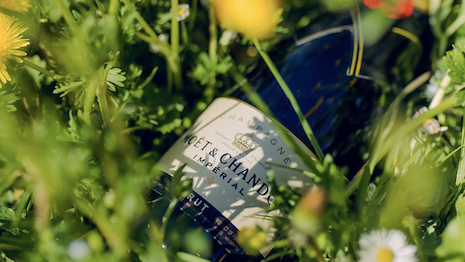
 Houses like LVMH’s Moët & Chandon are adapting to the changing climate, revealing ways that they plan to center sustainability in their high-end products. Image credit: Moët & Chandon
Houses like LVMH’s Moët & Chandon are adapting to the changing climate, revealing ways that they plan to center sustainability in their high-end products. Image credit: Moët & Chandon  At Four Seasons Resort Tamarindo, Mexico's rich epicurean traditions are honored throughout its menus. Image credit: Four Seasons
At Four Seasons Resort Tamarindo, Mexico's rich epicurean traditions are honored throughout its menus. Image credit: Four Seasons Veuve Clicquot is working with chefs to show how its sustainable La Grande Dame 2015 can work with localized and seasonal ingredients. Image courtesy of Veuve Clicquot
Veuve Clicquot is working with chefs to show how its sustainable La Grande Dame 2015 can work with localized and seasonal ingredients. Image courtesy of Veuve Clicquot In France, Ruinart is taking a look at what the seasons are saying, and so is the chef that it works with. Image credit: Ruinart
In France, Ruinart is taking a look at what the seasons are saying, and so is the chef that it works with. Image credit: Ruinart Louis Vuitton shows that even luxury fashion can benefit from green food activism. Image credit: Louis Vuitton
Louis Vuitton shows that even luxury fashion can benefit from green food activism. Image credit: Louis Vuitton Known as "crushing season," those staying at Four Seasons in northern California can participate in the signature practice of the area. Image credit: Four Seasons
Known as "crushing season," those staying at Four Seasons in northern California can participate in the signature practice of the area. Image credit: Four Seasons